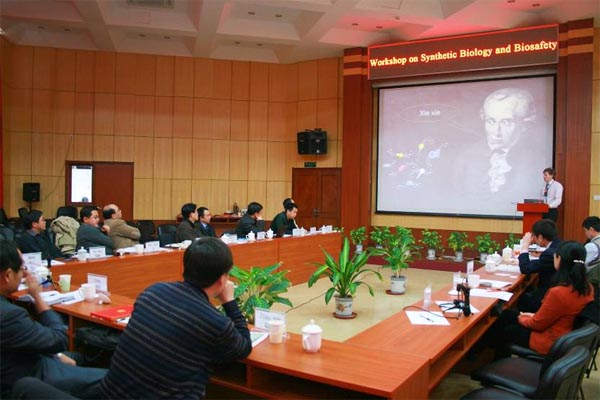January 20th, 2010, the Sino-Austria workshop on biosafety of synthetic biology was held in the Institute of Botany, CAS. The participants of the workshop were the researchers from universities around China and different institutes of CAS (IOB) together with the project leaders from the two cooperative institutes. This workshop is part of activities of the cooperative project “Collaboration study on the biosafety and risk assessment of synthetic biology between Austria and China” which has been co-funded by Austrian Science Fund (FWF grant no. I215-B17) and the National Natural Science Foundation of China (NSFC). The aims of this cooperation are to investigate the future needs of biosafety management of synthetic biology and to promote the cooperation between China and Europe.
Synthetic biology is an emerging scientific research area, which has potential applications in many aspects of natural science. It is a multiple disciplinary science of which biology, chemistry and physics are combined. It is about to design and synthesize biological system on molecular level to improve quality of life and health and to promote biosafety. The biosafety and risk assessment to synthetic biology may bring new needs to the current ones.
The morning section of the workshop was hosted by Dr. Wei WEI from IOB. First, Dr. Lei PEI from IDC gave an introduction on the definitions of synthetic biology and subfields, aiming to provide some basic concepts on this research field. Then Dr. Markus SCHMIDT from IDC and Prof. Guoqiang CHEN from Tsinghua Univ gave talks on the overview of synthetic biology in EU as well as in China respectively, aiming to find mutual interest and possible cooperation. That was followed by a talk from Prof. Xuemin ZHAO from Tianjin Univ about the difference between synthetic biology and genetic engineering. This topic was picked up well by the participants and was discussed thoroughly. To provide a better understanding on biosafety related issues of synthetic biology, Dr. Markus SCHMIDT gave a talk on overview of biosafety, security & risk assessment challenges for Synbio. Several key questions were brought up by this talk:
1). Are there new needs on risk assessment for synthetic biology?
2). Can the implements of synthetic biology make the genetic engineering safer?
3). Facing the simplicity of synthetic biology, how to deal with the do-it-self used by non professionals?
All of these are also the challenges that lie ahead in the research area of synthetic biology.
In the afternoon section of the workshop, both Dr. Wei WEI and Dr. Lei PEI gave introduction on the current biosafety regulation and risk assessment framework and the future needs. As for the discussion on these topics, more foci were given to the risk assessments on the engineered industrial strains. All participants agreed that these research activities should be carried out in the certificated biosafety labs while the safety level required for these activities was in question. The experts believed that it was critical to identify those biosafety issues truly related to synthetic biology and then to deal with the management based on these identified issues. Some suggested that the existed regulations from Europe and America would be used as templates yet the rules should be applied case-by-case. All these suggestions will be useful hints for our project.
By the end of the workshop, the two project leaders from both institutes concluded the workshop, acknowledged the supports from all the participants, and expressed willingness to make further cooperation. A database listed experts in synthetic biology from both Europe and China will be set up as well as the web-based platform will be provided for information exchange to promote the future cooperation on synthetic biology and biosafety. The workshop was then completed.
After the workshop, as part of the activities of the cooperative project, members from IDC and IOB had conducted an interview on Prof. Keping MA, the director of IOB. Prof. MA gave his support and suggestions on further implementation for this cooperative project, while ideas about the current development on synthetic biology and biosafety issues around it had been exchanged.

